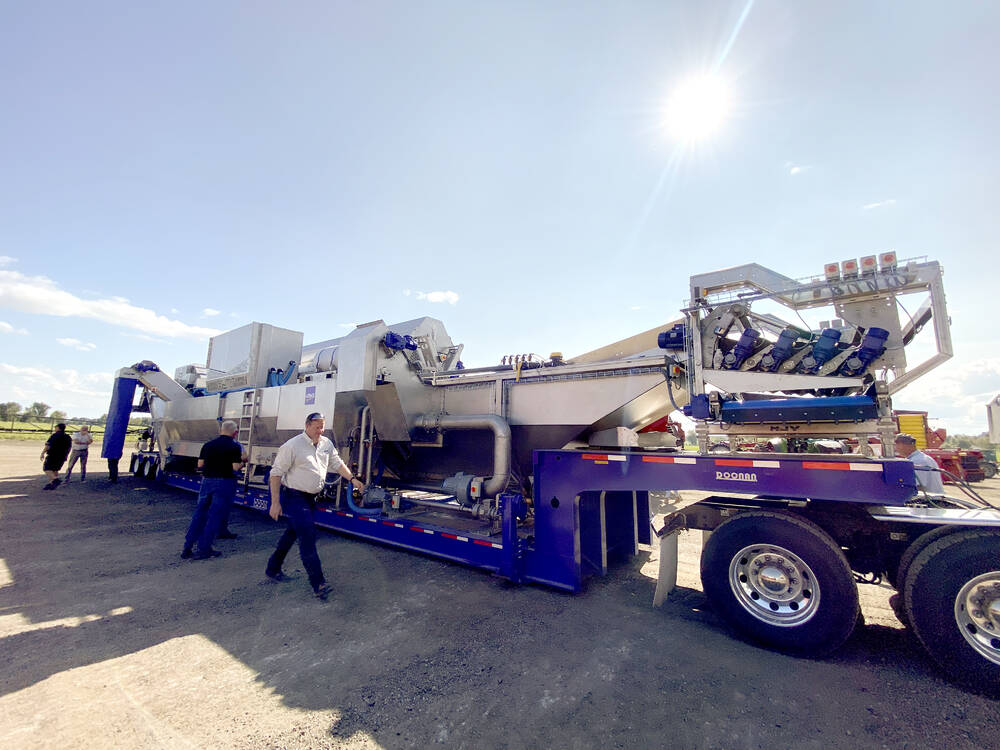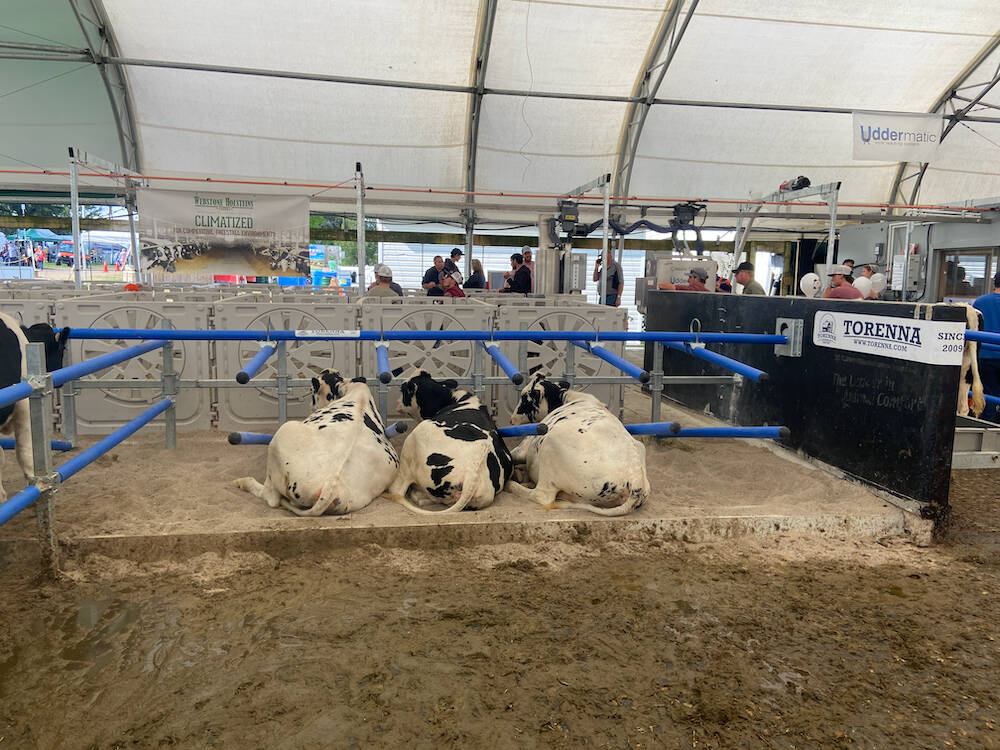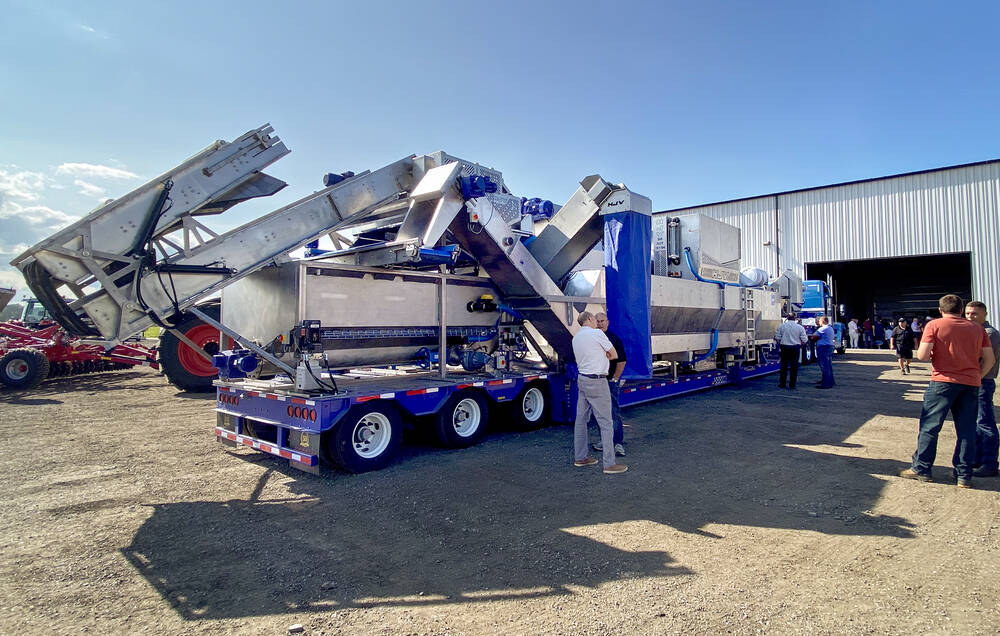Field side mobile potato washer appeals to Western fry producers

Read Also


Discussing the need for a livestock hub at Canada’s Outdoor Farm Show 2024
Livestock technology doesn’t get as much attention as crop technology and a Canadian hub with focus on livestock could help.
HJV Equipment’s mobile trailer washer made a massive splash at the Ontario Potato Field Day on Aug. 22.
The nine-metre trailer, equipped with levelling jacks, weighs 84,000 pounds dry and can process 200,000 pounds of potatoes an hour field-side with its 9,000-gallon water recirculation system.
“The concept behind this is that we can actually wash (potatoes) and keep recirculating the water around so we’re not constantly adding and discharging water,” explained Dan Mann, HJV’s VP of engineering.
Why it matters: HJV has several stationary washer systems in play and two trailer systems, but this is the first to feature the water recirculation system (WRS).
A Washington State fry producer prompted HJV’s engineering team to reconfigure the trailer system to fit the state’s stringent discharge regulations and manage water consumption.
“We realized that the water recirculation in these movable systems was very important,” Mann explained. “We put a test system into operation last fall, ran that, and then had to look at how we can actually build that into the washer trailer.”

photo:
Diana Martin
It took nine months to refine the system and research an affordable, biodegradable, food and soil health safe flocculant to pull smaller soil particles out of suspension during recirculation. Flocculant is applied based on measurements from a built-in turbidity sensor.
Mann explained that many flocculants contain heavy metals and salts that are not good for the environment and change the water pH, while HJV’s crustacean-based 10 per cent concentrated flocculant. The naturally positive liquid is more economical than the standard two to three per cent concentrates because less is needed to transport and use per litre.
“It’s two drops per litre, and we’ll be processing somewhere between 1,500 and 2,000 gallons an hour,” he said.
The stationary prototype used to fine-tune the trailer’s WRS system can be integrated into Ontario chip potato operations, even those without HJV systems, to feed water into the system and back into their existing system. to mitigate water discharge issues.
“There are regulations on what you can discharge outside, and with all the testing we’ve done, we can get the water down below those limitations,” he explained. “So even if you didn’t want to keep reusing the water, we could process the water and put it outside.”
The trailer has a complete electrical control system with internet connectivity through hardwire, hot spot or air card, allowing the operator to manipulate operations through an iPad from 200 feet or HJV to troubleshoot remotely.
“It’s something new we’ve started doing this year,” said Mann.


photo:
Diana Martin
The potatoes enter the system via a folding elevator at one end of the trailer, where a dirt table removes loose debris before it enters the destoning and washing tanks.
The destoner rotates approximately 1,000 gallons of water a minute. In the still water tank, heavy sediment settles where a sludge chain and conveyer removes it and disposes it via a shoot, explained Mann.
“We can also remove dry dirt, stones, clods, floating debris like corn, trash, ungerminated seed potatoes, hollow potatoes, grass tops, that type of thing,” he said.
The potatoes exit the system through a fractioning sizer, which allows the producer to pre-sort products into trucks for specific customers, once again providing savings and risk of deductions at the factory for dirt and size discrepancies.
Mann said that in the West, producers don’t have wash contracts for factory-bound fry potatoes despite the zero tolerance for stones and floating debris, which is difficult to achieve when sorting dry.
“Seven hundred transport trailer loads of potatoes leave storage every day going to fry factories in Washington State,” he said. “The chip stock industry has asked customers to wash their potatoes for 20 years, so they all have wash contracts. In Washington, they don’t have wash contracts.”
The trailer’s appeal is two-fold.
Producers can easily transport the wash trailer field-to-field, field-to-storage and state-to-state for those whose farms cover vast areas, and it provides washing opportunities without the heavy water discharge challenges.
“Potentially, if this machine were running without the WRS system, it would probably use 10,000 gallons a day, and that’s a problem,” he said. “Let’s say we run this for 10 days, that would have been 100,000 gallons, and we’re still going to discharge 10,000.”
Mann said there are already two trailer orders for Ontario and one for Michigan.
Source: Farmtario.com

